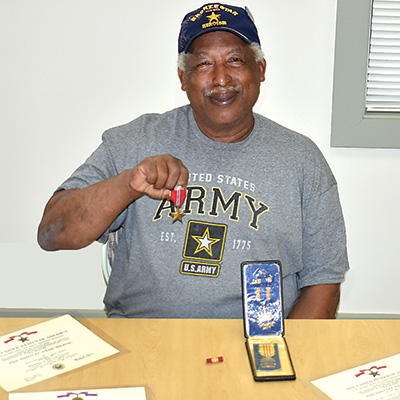
Veterans Day set for Monday
by Larry Chowning –
When Lewis Briggs Jr. of Locust Hill got his draft notice in 1968 to go into the United States Army, he thought someone was pulling a joke on him. He soon found out it was no joke!
Briggs had been turned down for service in 1966 because of an issue with his back that he had since birth. After being turned down, he got a job working for the Newport News Shipyard.
Two years later a draft notice came. “I went to Saluda and asked about the notice and a few weeks later I was on my way to Ft. Benning, Georgia, to the U.S. Army base,” he said.
It was the beginning of a living hell that would eventually land Briggs for one year in what was referred to as Vietnam War Zone C and War Zone D near the Cambodian border. The total area was called Big Red One Country. Briggs was a member of the 1st of the 28th Infantry Division, better known as Big Red One.
Missions
“I knew it was going to be a long war for me when on my first mission they sent me out with a few others into the ‘listening zone,’ ” he said. He explained that a platoon of troops would go out or be dropped off by helicopter into the jungles where “Charlie”—Viet Cong or North Vietnam Army (NVA) regulars—had been spotted.
“Our job was to search, destroy and bring back no prisoners,” said Briggs. “The listening zone was far out in front of our main body of the platoon. A few of us were sent out in advance to listen for the enemy and when we heard or spotted them we were to radio back for the rest to come forward.
“On that first mission for me, I spotted three NVA troops,” said Briggs. “We were supposed to radio back but they came up on us fast. We surprised them and opened fire, killing all three of them. That was the beginning of a whole lot of killing and a whole lot of dying.”
That first mission was the first of 50 jungle missions for Briggs, 25 of which were “Eagle Flight” missions. An Eagle Flight mission is when troops are dropped in by helicopter far into enemy sighting areas to search and destroy.
On one mission, Big Red One troops were taking on heavy fire from NVA troops. “People were getting shot all around me, and when the guns finally stopped, I went back to our base point,” he said. “I didn’t know it but my backpack was riddled with bullet holes and the fabric was smoking. My sergeant came running and told me to strip down so they could see if I had been shot anywhere.
“When they could not find any wounds, he passed me a cigarette and jokingly said, ‘Smoke this and inhale. If you have got any holes in you smoke will come out of the holes,’ ” said Briggs.
“We both laughed and it felt good at that moment to be alive and to have a laugh,” he said. “I didn’t smoke much but I took that cigarette from him and smoked it down to the butt.”
Machine gunner
“You did not want to be the guy who carried the machine gun,” explained Briggs. “The NVA and Viet Cong always tried to kill the machine gunner first.”
When Briggs earned The Bronze Star Medal “First Oak Leaf Cluster” for heroism it involved a machine gunner. “We had been dropped in by helicopter on a mission and took on heavy fire almost before we hit the ground,” he said. “Our machine gunner was hit early and I moved up to help him and started firing until a medic was able to get to him.
“My reward for that was for the rest of my missions in Vietnam I was the man who carried the machine gun,” he said. “Once when I was firing away, a hand grenade came rolling toward me and I thought for certain I was going to die. It did not go off!”
Briggs was awarded The Bronze Star of heroism on January 1970 for assisting in saving the life of the machine gunner and others.
There is a God!
“The hand grenade incident was one of several close calls for me,” said Briggs. “I came so close to dying so many times and all I can tell you is . . . it was not my time to go.
“I believed in God before I went to Vietnam but I really believed in him when after the 365 days of hell in Vietnam ended and I stepped off that plane back home in the United States,” he said. “There is no way I could have lived through that hell without God’s help! Men died a foot away from me and I always came back without a scratch. I did not earn a Purple Heart and I’m damn glad I didn’t.”
Was it worth it?
Briggs said he was proud to have served his country but he wishes it had been for a better cause. “I would go to war in a minute for my country if it was a just cause,” he said. “But, I would not put the nightmare of the Vietnam War on anyone.”
When Briggs came home, he lamented the attitude of many who called him and others who fought in the war “baby killers.”
“We feared the troops of the NVA, but the Viet Cong were untrained and had a mindset to kill and run,” said Briggs. “The NVA had the firepower and determination to fight you as long as they wanted.”
The Viet Cong did not. They had 12 and 13 year old children in their ranks, sometimes armed with poison tipped spears and sometimes with live hand grenades strapped to their bodies to go off when they got close enough to U.S. troops.
“If we killed children it was because they were coming at us trying to kill us,” he said. “You had to kill them or they would kill you.”
Briggs said he never witnessed anything near what happened at the My Lai massacre in 1968 when a platoon of U.S. soldiers brutally killed about 500 unarmed civilians. “That happened before I got over there and I never saw anything like that happen.
“I can tell you from first hand experience that war is hell,” said Briggs. “I can only hope there will never be another war like the Vietnam War. A lot of young men died and I’m not sure for what!”
Medals
Briggs won The Bronze Star Medal, and The Air Medal twice “for Meritorious achievement while participating in aerial flights.”
The official military papers for The Bronze Star won by Briggs state: “Private First Class Briggs was serving as a rifleman when his platoon . . . was ambushed and under intense fire from an unknown size enemy force.
“With complete disregard for his personal safety, he maneuvered through the hail of hostile rounds to the point of contact and directed suppressive barrages on the insurgent positions,” it stated.
“When he observed a machine gunner wounded, he moved forward and secured the weapon and continued to brave the fire. He provided devastating fire which enabled an evacuation team to extract several casualties.
“His display of personal bravery is in keeping with the finest tradition of military service and reflects great credit upon him.”



